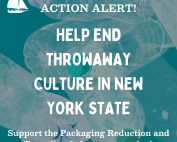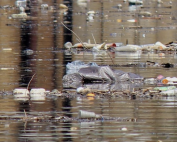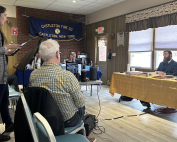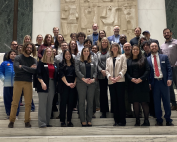For more than half a century, Clearwater has worked to protect the Hudson River through grassroots organizing in waterfront/Hudson Valley communities. Over the years Clearwater has been instrumental in advocating for the closure and now for the safe decommissioning of the Indian Point Nuclear Power Plant, for a comprehensive cleanup of General Electric’s legacy polychlorinated biphenyls (PCBs) pollution, and countless other campaigns that protect the Hudson River and the well-being of the residents on its shores.
Clearwater remains committed to our mission to protect the Hudson River, and to our efforts to raise public awareness of the issues threatening the river. We believe an educated and engaged citizenry is a powerful force for change.
Request a speaker from Clearwater
Stand up for the Hudson River – Ways to take action:
Protect the Hudson River from Aquatic Invasive Species: Ask Governor Hochul to stop invasive species from entering the Hudson River through the Erie Canal. Learn more and take action!
Clearwater’s Advocacy Priorities (2024-2025)
PCBs
Between 1947-1977 General Electric discharged over one million pounds of toxic polychlorinated biphenyls (PCBs) into the Hudson River, creating one of the largest Superfund Sites in the United States. PCBs take decades to break down and have accumulated in the sediment, water, and wildlife posing risks to ecological and human health. A review of the Superfund cleanup is due every 5-years, including a report on how successful the cleanup remedy has been, known as a Protectiveness Determination. Clearwater will be carefully watching this process along with our partners Friends of a Clean Hudson, and will keep the public engaged and informed. Learn more about General Electric’s polychlorinated biphenyls (PCBs) contamination of the Hudson River.
Indian Point
After decades of grassroots advocacy and legal action by Clearwater and our partners, the last reactor at the Indian Point Nuclear Power Plant closed in April 2021. In collaboration with the Indian Point Convergence, Clearwater successfully championed the creation of a Decommissioning Oversight Board to oversee the decommissioning of the facility. Clearwater continues to be an active advocate and ally to the community striving to ensure the safest decommissioning possible. Learn more about our work on Indian Point.
Newburgh PFAS Drinking Source Water Contamination
The City of Newburgh’s drinking water source, Washington Lake was contaminated with Per- and poly-fluoroalkyl substances (PFAS) from firefighting foam runoff from Stewart Air National Guard Base. PFAS has been linked to increased cholesterol, increased risk of high blood pressure in pregnant women, decreased infant birth rates, and heightened risks of kidney or testicular cancer. Since May 2, 2016, the City of Newburgh has received drinking water from alternative sources, though PFAS-contaminated Washington Lake remains the permanent drinking water source for the City of Newburgh. Clearwater is a member of the Restoration Advisory Board and joins the community in advocating for timely remediation of Washington Lake. Learn more about Newburgh’s drinking source water contamination.
New York State Canal System + Invasive Species
The Erie Canal and Mohawk River have become a thoroughfare for invasive species to enter the Hudson River from the Great Lakes. A recent example is the round goby – native to Eurasia, gobies are voracious feeders, reproduce rapidly, and compete with native species for food, habitat, and spawning areas. The spread of non-native species into the Hudson through the canal is not a new occurrence, and unless swift action is taken, it will not be the last. On the horizon are species including invasive carp, which are populous in the Mississippi watershed and on the doorstep of the Great Lakes Watershed. Once there, they could follow the goby’s route to the Hudson.
Swimmable Hudson
Clearwater was an instrumental force in the initial passage of the Clean Water Act in 1972, which established goals of zero water pollution discharges by 1985 and for all U.S. waters to be swimmable and fishable by 1983. Nearly 40 years later, the Hudson River ecosystem and swimmability are improving, but discharges continue, the river is not always safe for swimming and significant fish consumption advisories remain in place. Clearwater will continue to support efforts to improve water quality and quicken progress toward CWA goals, through advocacy, education, and amplifying the desire of communities to fish and swim in the Hudson River safely.
For more information about Clearwater’s Environmental Action work, contact Jen Benson, Environmental Action Director at jen@clearwater.org.
Help us continue our efforts to protect the Hudson River. Support Clearwater’s Environmental Action efforts.
Recent blog posts
With the Hudson River PCBs Superfund Site Five-Year Review Approaching, Congressional Leaders Urge EPA to Rule that Additional Cleanup is Needed
FOR IMMEDIATE RELEASE Apr 16, 2024 With the Hudson River PCBs Superfund Site Five-Year Review Approaching, Congressional Leaders Urge EPA to Rule that Additional Cleanup is Needed General Electric discharged more than a million [...]
Members of Stewart Air National Guard Restoration Advisory Board Applaud EPA’s First National Drinking Water Standards for Toxic PFAS “Forever Chemicals”
Newly established Federal Maximum Contaminant Levels (MCL) of six per- and poly-fluoroalkyl substances (PFAS) in drinking water will reduce exposure in many Hudson Valley communities and should influence the cleanup of contamination affecting Newburgh and [...]
Environmental Justice Leaders Convene to Demand EPA Take Action to Address Legacy Toxic Pollution in the Hudson River
March 20, 2024 Environmental Justice Leaders Convene to Demand EPA Take Action to Address Legacy Toxic Pollution in the Hudson River Albany, NY – Statewide leaders in environmental justice gathered to demand the [...]
Take Action: Help reduce packaging waste in New York State!
New York State has an opportunity to reduce packaging waste, make remaining packaging recyclable, and at the same time cut out toxic chemicals - will you help make it happen? The Packaging Reduction and Recycling [...]
Single Use Plastics 101
A Brief Introduction to Single-Use Plastics and How You Can Help Reduce Their Use and Impact As the global population has grown, the production and use of single-use plastics have accelerated tremendously. A modern convenience, [...]
Threat of Fracking Returns to New York State
(Photo Credit: WRGB) Last fall, Southern Tier Solutions, a Texas-based company contacted 6,500 landowners in three counties inviting them to lease their land for gas extraction and CO2 storage. Although hydraulic fracturing (fracking [...]
The Hudson River Shoreline in Castleton: So Close and Yet So Far
For nearly 30 years, the Village of Castleton-on-Hudson has been waiting for access to its municipal waterfront park on the shoreline of the Hudson River. Between the community and their park stands a locked gate [...]
2024 Hudson River Advocacy Day
Clearwater goes to Albany for Hudson River Advocacy Day Yesterday Clearwater’s Executive Director David Toman, Environmental Action Director Jen Benson, and Board Member Steve Stanne participated in Hudson River Advocacy Day, joining fellow [...]






